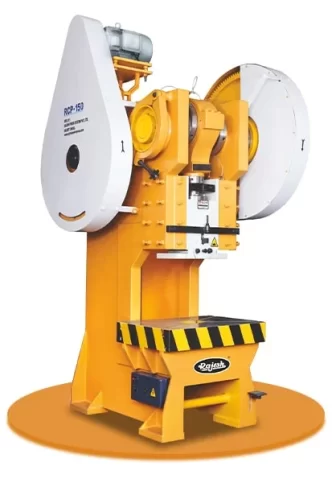
Rising Demand for Power Press Machines in Gulf Countries.
The Gulf region, known for its strong industrial expansion and infrastructure development, is experiencing a considerable increase in demand for power press machines. Power presses, which are essential for metalworking and fabrication, have become important in a wide range of industries, including automotive, aerospace, construction, and manufacturing. As Gulf Cooperation Council (GCC) countries diversify their economies and improve industrial capacities, the need for modern machinery such as power press machines has increased. This blog explores the key factors driving this demand and the trends shaping the market in Gulf countries.
1. Industrial Development in the Gulf Region: The Role of Power Press Machines
The industrial sector in the Gulf countries, particularly Saudi Arabia, the UAE, and Qatar, rapidly expanding. Governments heavily invest in non-oil sectors as part of their economic diversification strategies. This growth requires advanced technology for large-scale manufacturing and production, with power press machines playing an important role in metal shaping, bending, and cutting.
2. Building and fixing up infrastructure
The Gulf region is the site of some of the World’s most significant infrastructure initiatives. Mega construction projects, including the Neom smart city in Saudi Arabia and Expo 2020 (now Dubai Expo 2021), have substantially increased the demand for metalworking equipment, including power press machines. The construction industry, which manufactures components such as metal panels, frames, and structural elements, depends on the precision of hydraulic press machines. Demand for these machines will increase as infrastructure development continues.
3. Growth in the automotive and aerospace industries.
The automotive and aerospace industries are major drivers of demand for power press machines in the Gulf countries. Countries such as the UAE and Saudi Arabia are investing in these industries as part of their efforts to strengthen domestic manufacturing capabilities. Power press machines are essential for manufacturing automotive components, aviation parts, and heavy-duty metal goods. As the region positions itself as a manufacturing base, particularly for exports, there is an increasing demand for innovative power press technology.
4. Technological Advancements and Automation
One of the main developments in the Gulf market is the increasing usage of modern power press machines equipped with the latest technology and automation features. CNC-controlled power press machines provide better precision, speed, and efficiency, all required to satisfy today’s high industry standards. Automation has reduced human error and boosted production capacity. Thus, many businesses are upgrading their current machinery to more advanced ones.
5. Increased Demand for Metal Products in Oil & Gas
Despite efforts to diversify economies, the oil and gas industry remains a backbone of the Gulf region. Power press machines are critical for producing various components used in oil and gas equipment, pipelines, and refinery infrastructure. With oil prices stabilizing and renewed investments in energy infrastructure, the demand for power press machines that can handle high-grade metals and alloys is expected to rise.
6. Rising Demand for Metal Products in Oil and Gas
While the market for power press machines is growing, industries face challenges, including high initial investment costs and the need for skilled operators. However, these challenges are gradually being addressed with government-backed training programs and increased focus on industrial education. The future looks promising for the Gulf’s power press machine market, with sustained demand from key sectors like construction, automotive, and energy.
7. Growth of Export Markets in Neighboring Regions
Gulf countries are rapidly positioning themselves as export hubs for metal products and machinery, serving neighbouring regions such as Africa, South Asia, and Europe. Power press machines are important in producing high-quality metal components for these markets. The increased demand for completed goods and machinery exports has prompted investments in modern power press technology, assuring Gulf manufacturers’ competitiveness in worldwide markets.
8. Growth of Free Trade Zones and Industrial Parks
Creating free trade zones (FTZs) and industrial parks around the Gulf, particularly in nations such as the UAE, Qatar, and Oman, has made it simpler for businesses to construct manufacturing units with lower tariffs and regulatory requirements. These zones frequently focus on heavy industry and manufacturing, making them appropriate for power press machinery. The availability of raw materials and streamlined logistics in FTZs drive the need for efficient metalworking machinery.
9. Rising demand for customization in manufacturing.
As Gulf countries increase their industrial base, there is a growing need for bespoke products across all industries. Power press machines enable producers to create custom metal parts that meet specific criteria. Whether for specialized equipment, automotive components, or construction materials, personalizing metalworking processes is critical for organizations looking to stand out in competitive industries.
Conclusion
The increasing need for power press machines in Gulf countries is due to industrial diversification, infrastructure expansion, and technical improvements. As Gulf nations improve their manufacturing and industrial capacities, the power press machine market will likely expand rapidly. Companies in the region are rapidly investing in modern machinery to remain competitive, and with continued government assistance, this trend is set to accelerate in the coming years.
Businesses may capitalize on the potential available in the Gulf market for power press machines by keeping an eye on the major drivers and trends.

